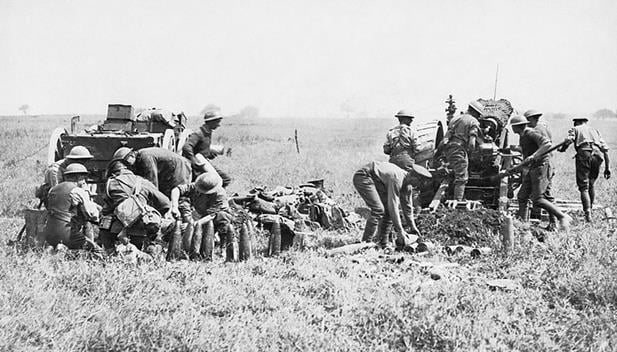On August 8th, 1918, the battle of Amiens began, with stunning success. It was a masterpiece of planning and execution, utterly different from the blood-soaked failures of previous attacks—which included the Kaiserschlacht of July 1918. Amiens was a surprise attack led by some 500 tanks, with infantry following 200 yards behind the creeping barrage. No artillery had opened up before zero hour, 4:20 a.m., and preliminary bombardment even for registration had been forbidden. The British Army, unlike the German, did not have storm troops (specially trained units) but they had what everyone understood, the Australian and Canadian brigades. These were the
finest troops in the Allied armies. Their presence in the frontline—a trench raid could have picked up one or two—would have alerted German intelligence to the Schwerpunkt of the coming attack, so the four Canadian and four Australian divisions were held back well behind the frontline until the last possible moment. Some Canadians were actually on their way to the front on the morning of August 8th. In the event, the Allied forces simply rolled over the German lines, and in two hours took 16,000 prisoners. Nothing like it had been seen in the war before. The Amiens victory, unlike all other offensives, achieved the ultimate objective of defeating the mind of the opposing commander. Ludendorff wrote in his memoirs:
“August 8 was the black day of the German Army . . . it opened the eyes of the staff on both sides; mine were certainly opened . . . The Emperor told me later on, after the failure of the July offensive and after August 8, he knew that the war could not be won.”
Amiens set in train the events that led to the Armistice, effectively the defeat of Germany. So the commemoration of this mighty and all-significant battle too place in Amiens Cathedral on August 8 2018. Representatives of Britain and its Allies, Germany, France were present. A choir sang “Over here.” Prince William spoke of the “spirit of co-operation” and the Entente Cordiale; Theresa May praised the “coalition” that alone made victory possible. Only one high absentee was noted: President Macron. He did not leave his Fort Bregancon retreat for the occasion, and the French Prime Minister was also absent. It is possible that they refused to endorse a British (Imperial) victory, details of which had been withheld from the French lest security should be endangered. (An old fear, seen again in the Kossovo operations.) One can choose between “snub” and “insult” to describe Macron’s absence. Woody Allen said “85% of life is showing up.” Macron didn’t.



Leave a Reply